Bernd Aldor (1881-1950) was a star of the German silent cinema in the 1910s and 1920s, often in films by Richard Oswald or Lupu Pick. Sound film and the Nazi regime broke the career of this Jewish actor.

German postcard by Verlag Hermann Leiser, Berlin, no. 3028.
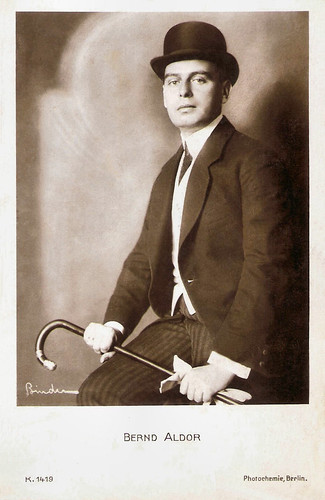
German postcard by Photochemie, no. K.1419. Photo: Alex Binder, Berlin.
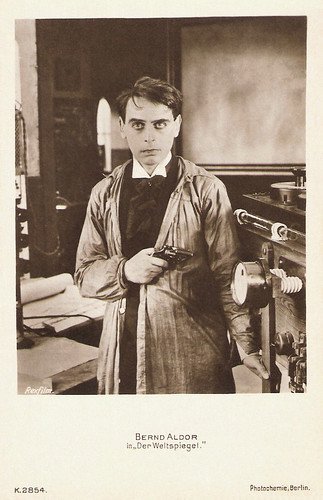
German postcard by Photochemie, Berlin, no. K.2854. Photo: Rexfilm. Bernd Aldor in Der Weltspiegel/The World Mirror (Lupu Pick, 1918).

German postcard by Verlag Hermann Leiser, Berlin, no. 3151. Photo: Richard-Oswald-Produktion. Bernd Aldor as Dorian Gray in Das Bildnis des Dorian Gray/The Picture of Dorian Gray (Richard Oswald, 1917), an adaptation of Oscar Wilde's novel The Picture of Dorian Gray.
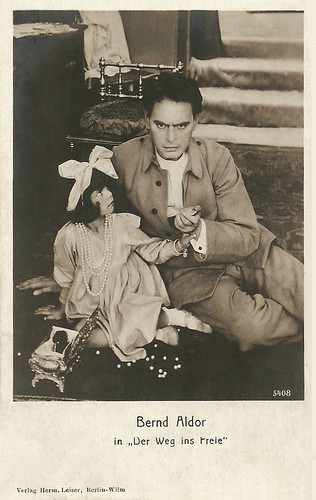
German postcard by Verlag Herman Leiser, Berlin, no. 5408. Photo: Bernd Aldor in Der Weg ins Freie/The way to the outdoors (Richard Oswald, 1918).
Bernd Aldor was born in Constantinople, the former Ottoman Empire (now Istanbul, Turkey) in 1881 (IMDb and Filmportal.de write wrongly 1887).
Shortly before the turn of the century he took acting lessons in Vienna at the master class of Karl Arnau. He began his theatrical career as an extra at the Hofburgtheater, the later Burgtheater.
In 1900 he received his first permanent engagement in Znaim (Znojmo). From 1903 on his other theatre stations included Czernowitz, Trier, Bremen, Königsberg, Leipzig, Dresden and Hamburg.
In 1906 he came to Berlin to work at the Schiller Theater. During a performance of Leo Tolstoy's The Living Corpse at the Schauspielhaus Leipzig he was discovered for the film by Charles Decroix.
His film debut was probably the German short film Die Czernowska/That Czernowska Woman (Charles Decroix, 1913), of which scenes were edited in Lyrisch Nitraat/Lyrical Nitrate (Peter Delpeut, 1991).
Other films he made with Decroix were Der Fleck/The Stain (Charles Decroix, 1913) starring Wolfgang Neff, and Das Ave Maria/The Ave Maria (Charles Decroix, 1913) opposite Fern Andra, the great American diva of the German silent cinema.
Aldor appeared also opposite another silent film diva, Henny Porten, in Die große Sünderin/The Great Sinner (Curt A. Stark, 1914), and with the young deceased Dorrit Weixler in Aschenbrödelchen/Little Cinderella (1915).
During WWI, he worked with director Richard Oswald for the first time, at Zirkusblut/Circus Blood (Richard Oswald, 1916) and at Seine letzte Maske/His last mask (Richard Oswald, 1916). In both films he played the lead role, like in most of his films during this period.
Aldor became well-known with his performances in the first two parts of a trilogy of Aufklärungsfilme (typical German educational films), Es werde Licht/There Will Be Light (Richard Oswald, 1917-1918). He played Dr. Mauthner, head of an institution for children suffering from syphilis.
He also appeared in Oswald's literary film adaptations Das Bildnis des Dorian Gray/The Picture of Dorian Gray (Richard Oswald, 1917) based on the classic novel by Oscar Wilde, and Tolstoy's Der lebende Leichnam/The Living Corpse (Richard Oswald, 1918), which he had earlier performed on stage.
From 1917 to 1919 he was also the star of several film by actor-writer-director Lupu Pick, such as Die Liebe des Van Royk/The Love of Van Royk (Lupu Pick, 1918), Der Weltspiegel/The Mirror World (Lupu Pick, 1918) and Mein Wille ist Gesetz/My will is law (Lupu Pick, 1919) with Olga Engl.

German postcard by Hermann Leiser Verlag, Berlin, no. 3152. Photo: Richard-Oswald-Produktion. Bernd Aldor in Das Bildnis des Dorian Gray (Richard Oswald, 1917), an adaptation of Oscar Wilde's The Picture of Dorian Gray.
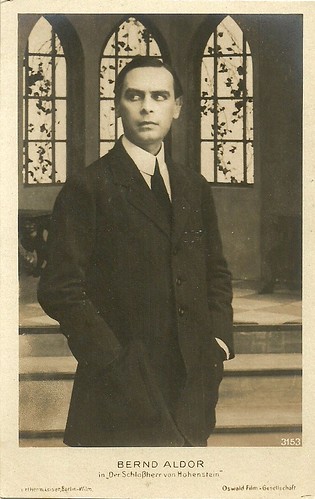
German postcard by Verlag Hermann Leiser, Berlin, no. 3153. Photo: Richard Oswald-Film. Bernd Aldor in Der Schloßherr von Hohenstein/The manor of Hohenstein (Richard Oswald, 1917).
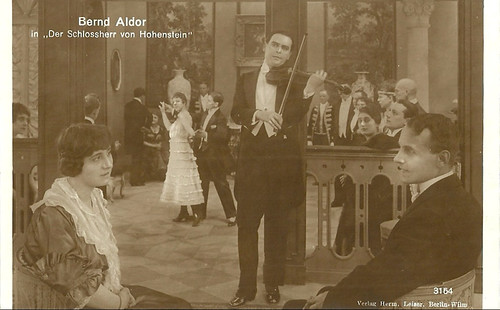
German postcard by Verlag Hermann Leiser, Berlin, no. 3154. Photo: Richard Oswald-Film. Bernd Aldor playing the violin in the German silent film Der Schloßherr von Hohenstein/The manor of Hohenstein (Richard Oswald, 1917).

German postcard in the Bernd Aldor Series 1917/1918 III. by Verlag Herman Leiser, Berlin-Wilm. Phot: Richard Oswald Film. Bernd Aldor in Der Weg ins Freie (Richard Oswald, 1918).

German postcard by Photochemie, Berlin, no. K.2853. Bernd Aldor in Der Weltspiegel/The World Mirror (Lupu Pick, 1918). The woman could be Gertrud Welcker.

German postcard by Photochemie, Berlin, K.2855. Photo: Rexfilm. Bernd Aldor in Die Liebe des van Royk/The Love of van Royk (Lupu Pick, 1917). Though the woman right of Aldor looks like Ria Jende, she is not named among the actresses in Filmportal.de. the postcard names the character von Royk instead of van Royk.
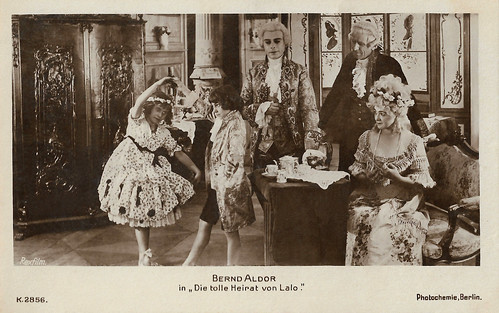
German postcard Photochemie, Berlin, no. K.2856. Photo: Rexfilm. Bernd Aldor in Die tolle Heirat von Laló/The great marriage of Laló (Lupu Pick, 1918).
Until the mid-1920s, Bernd Aldor was seen in leading roles. He starred as Talma opposite Fern Andra again in Madame Récamier (Joseph Delmont, 1920). In the drama Die Furcht vor dem Weibe/The fear of the woman (Hanna Henning, 1921) he starred opposite Otto Gebühr.
He appeared at the side of the great comedian Hermann Valentin in Graf Cohn/Count Cohn (Carl Boese, 1923), and with Claire Rommer in Aschermittwoch/Ash Wednesday (1925), directed by his old co-star Wolfgang Neff, who had turned into a director.
He reunited with Oswald for Halbseide/Half silk (Richard Oswald, 1925) as the husband of Mary Parker.
From 1927 on his film parts became smaller. He played supporting parts in Die glühende Gasse/The glowing alley (Paul Sugar, 1927) starring Hans Albers, the comedy Schwere Jungs - leichte Mädchen/Guys and Dolls (Carl Boese, 1927) starring Gustav Fröhlich and Lissi Arna, and Indizienbeweis/Circumstantial evidence (Georg Jacoby, 1929) starring Fritz Alberti.
Then he slowly fell into oblivion, but he did some small film appearances in the sound era. Richard Oswald gave him a small part in his sound film Dreyfus (Richard Oswald, 1930) starring Fritz Kortner and Heinrich George.
His final film appearance was in Elisabeth von Österreich/Elisabeth of Austria (Adolf Trotz, 1931) starring Lil Dagover. In 1932, Aldor was committed by the Romanian actor Constantin Tanase to direct a film in Berlin, Visul lui Tanase/Tanase's Dream (Bernd Aldor, 1932).
In July 1938, he was excluded from the Reichsfilmkammer because of his "probably not Aryan" origin, although he had not been active for the cinema since 1932. Maybe the Jewish Bernd Aldor had fled the country. There is no information about him during this period.
Wikipedia writes that only in 1950 he and his wife Hilde were 'detected' again, now in Vienna, Austria. A little later the former actor died there, in 1950. He was 69.

German postcard by NPG (Neue Photographische Gesellschaft), no. 811. Photo: Anny Eberth, Berlin.
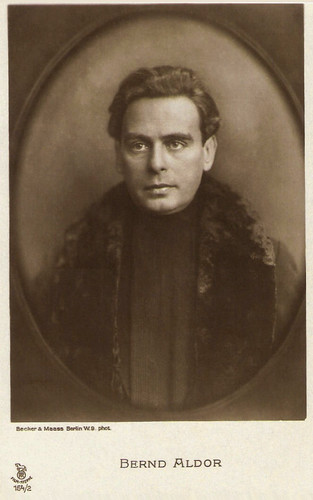
German postcard in the Film Sterne series by Rotophot., no. 164/2. Photo: Becker & Maass, Berlin.

German postcard by Verlag Hermann Leiser, Berlin-Wilm., no. 3148. Photo: Martin Herzfeld, Dresden.

German postcard by Verlag Hermann Leiser, Berlin-Wilm., no. 3150. Photo: Martin Herzfeld, Dresden.
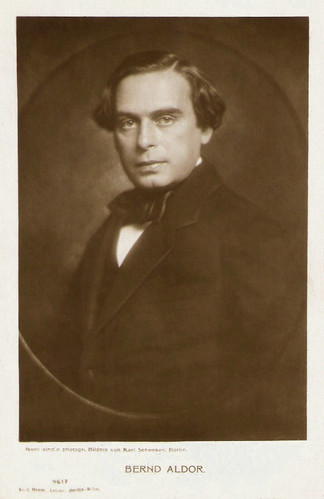
German postcard by Verlag Hermann Leiser, Berlin-Wilm., no. 3617. Photo: Karl Schenker, Berlin.

German postcard by Ross Verlag, Berlin, no. 419/2, 1919-1924. Photo: Becker & Maass.

German postcard by Ross Verlag, no. 419/3, 1919-1924. Photo: Becker & Maass, Berlin.

German postcard in the Film Sterne series by Rotophot, Berlin, no. 164/1. Photo: Becker & Maass, Berlin.
Sources: Thomas Staedeli (Cyranos), Filmportal.de, Wikipedia (German), and IMDb.

German postcard by Verlag Hermann Leiser, Berlin, no. 3028.

German postcard by Photochemie, no. K.1419. Photo: Alex Binder, Berlin.

German postcard by Photochemie, Berlin, no. K.2854. Photo: Rexfilm. Bernd Aldor in Der Weltspiegel/The World Mirror (Lupu Pick, 1918).

German postcard by Verlag Hermann Leiser, Berlin, no. 3151. Photo: Richard-Oswald-Produktion. Bernd Aldor as Dorian Gray in Das Bildnis des Dorian Gray/The Picture of Dorian Gray (Richard Oswald, 1917), an adaptation of Oscar Wilde's novel The Picture of Dorian Gray.

German postcard by Verlag Herman Leiser, Berlin, no. 5408. Photo: Bernd Aldor in Der Weg ins Freie/The way to the outdoors (Richard Oswald, 1918).
Aufklärungsfilme
Bernd Aldor was born in Constantinople, the former Ottoman Empire (now Istanbul, Turkey) in 1881 (IMDb and Filmportal.de write wrongly 1887).
Shortly before the turn of the century he took acting lessons in Vienna at the master class of Karl Arnau. He began his theatrical career as an extra at the Hofburgtheater, the later Burgtheater.
In 1900 he received his first permanent engagement in Znaim (Znojmo). From 1903 on his other theatre stations included Czernowitz, Trier, Bremen, Königsberg, Leipzig, Dresden and Hamburg.
In 1906 he came to Berlin to work at the Schiller Theater. During a performance of Leo Tolstoy's The Living Corpse at the Schauspielhaus Leipzig he was discovered for the film by Charles Decroix.
His film debut was probably the German short film Die Czernowska/That Czernowska Woman (Charles Decroix, 1913), of which scenes were edited in Lyrisch Nitraat/Lyrical Nitrate (Peter Delpeut, 1991).
Other films he made with Decroix were Der Fleck/The Stain (Charles Decroix, 1913) starring Wolfgang Neff, and Das Ave Maria/The Ave Maria (Charles Decroix, 1913) opposite Fern Andra, the great American diva of the German silent cinema.
Aldor appeared also opposite another silent film diva, Henny Porten, in Die große Sünderin/The Great Sinner (Curt A. Stark, 1914), and with the young deceased Dorrit Weixler in Aschenbrödelchen/Little Cinderella (1915).
During WWI, he worked with director Richard Oswald for the first time, at Zirkusblut/Circus Blood (Richard Oswald, 1916) and at Seine letzte Maske/His last mask (Richard Oswald, 1916). In both films he played the lead role, like in most of his films during this period.
Aldor became well-known with his performances in the first two parts of a trilogy of Aufklärungsfilme (typical German educational films), Es werde Licht/There Will Be Light (Richard Oswald, 1917-1918). He played Dr. Mauthner, head of an institution for children suffering from syphilis.
He also appeared in Oswald's literary film adaptations Das Bildnis des Dorian Gray/The Picture of Dorian Gray (Richard Oswald, 1917) based on the classic novel by Oscar Wilde, and Tolstoy's Der lebende Leichnam/The Living Corpse (Richard Oswald, 1918), which he had earlier performed on stage.
From 1917 to 1919 he was also the star of several film by actor-writer-director Lupu Pick, such as Die Liebe des Van Royk/The Love of Van Royk (Lupu Pick, 1918), Der Weltspiegel/The Mirror World (Lupu Pick, 1918) and Mein Wille ist Gesetz/My will is law (Lupu Pick, 1919) with Olga Engl.

German postcard by Hermann Leiser Verlag, Berlin, no. 3152. Photo: Richard-Oswald-Produktion. Bernd Aldor in Das Bildnis des Dorian Gray (Richard Oswald, 1917), an adaptation of Oscar Wilde's The Picture of Dorian Gray.

German postcard by Verlag Hermann Leiser, Berlin, no. 3153. Photo: Richard Oswald-Film. Bernd Aldor in Der Schloßherr von Hohenstein/The manor of Hohenstein (Richard Oswald, 1917).

German postcard by Verlag Hermann Leiser, Berlin, no. 3154. Photo: Richard Oswald-Film. Bernd Aldor playing the violin in the German silent film Der Schloßherr von Hohenstein/The manor of Hohenstein (Richard Oswald, 1917).

German postcard in the Bernd Aldor Series 1917/1918 III. by Verlag Herman Leiser, Berlin-Wilm. Phot: Richard Oswald Film. Bernd Aldor in Der Weg ins Freie (Richard Oswald, 1918).

German postcard by Photochemie, Berlin, no. K.2853. Bernd Aldor in Der Weltspiegel/The World Mirror (Lupu Pick, 1918). The woman could be Gertrud Welcker.

German postcard by Photochemie, Berlin, K.2855. Photo: Rexfilm. Bernd Aldor in Die Liebe des van Royk/The Love of van Royk (Lupu Pick, 1917). Though the woman right of Aldor looks like Ria Jende, she is not named among the actresses in Filmportal.de. the postcard names the character von Royk instead of van Royk.

German postcard Photochemie, Berlin, no. K.2856. Photo: Rexfilm. Bernd Aldor in Die tolle Heirat von Laló/The great marriage of Laló (Lupu Pick, 1918).
Oblivion
Until the mid-1920s, Bernd Aldor was seen in leading roles. He starred as Talma opposite Fern Andra again in Madame Récamier (Joseph Delmont, 1920). In the drama Die Furcht vor dem Weibe/The fear of the woman (Hanna Henning, 1921) he starred opposite Otto Gebühr.
He appeared at the side of the great comedian Hermann Valentin in Graf Cohn/Count Cohn (Carl Boese, 1923), and with Claire Rommer in Aschermittwoch/Ash Wednesday (1925), directed by his old co-star Wolfgang Neff, who had turned into a director.
He reunited with Oswald for Halbseide/Half silk (Richard Oswald, 1925) as the husband of Mary Parker.
From 1927 on his film parts became smaller. He played supporting parts in Die glühende Gasse/The glowing alley (Paul Sugar, 1927) starring Hans Albers, the comedy Schwere Jungs - leichte Mädchen/Guys and Dolls (Carl Boese, 1927) starring Gustav Fröhlich and Lissi Arna, and Indizienbeweis/Circumstantial evidence (Georg Jacoby, 1929) starring Fritz Alberti.
Then he slowly fell into oblivion, but he did some small film appearances in the sound era. Richard Oswald gave him a small part in his sound film Dreyfus (Richard Oswald, 1930) starring Fritz Kortner and Heinrich George.
His final film appearance was in Elisabeth von Österreich/Elisabeth of Austria (Adolf Trotz, 1931) starring Lil Dagover. In 1932, Aldor was committed by the Romanian actor Constantin Tanase to direct a film in Berlin, Visul lui Tanase/Tanase's Dream (Bernd Aldor, 1932).
In July 1938, he was excluded from the Reichsfilmkammer because of his "probably not Aryan" origin, although he had not been active for the cinema since 1932. Maybe the Jewish Bernd Aldor had fled the country. There is no information about him during this period.
Wikipedia writes that only in 1950 he and his wife Hilde were 'detected' again, now in Vienna, Austria. A little later the former actor died there, in 1950. He was 69.

German postcard by NPG (Neue Photographische Gesellschaft), no. 811. Photo: Anny Eberth, Berlin.

German postcard in the Film Sterne series by Rotophot., no. 164/2. Photo: Becker & Maass, Berlin.

German postcard by Verlag Hermann Leiser, Berlin-Wilm., no. 3148. Photo: Martin Herzfeld, Dresden.

German postcard by Verlag Hermann Leiser, Berlin-Wilm., no. 3150. Photo: Martin Herzfeld, Dresden.

German postcard by Verlag Hermann Leiser, Berlin-Wilm., no. 3617. Photo: Karl Schenker, Berlin.

German postcard by Ross Verlag, Berlin, no. 419/2, 1919-1924. Photo: Becker & Maass.

German postcard by Ross Verlag, no. 419/3, 1919-1924. Photo: Becker & Maass, Berlin.

German postcard in the Film Sterne series by Rotophot, Berlin, no. 164/1. Photo: Becker & Maass, Berlin.
Sources: Thomas Staedeli (Cyranos), Filmportal.de, Wikipedia (German), and IMDb.
1 comment:
Gracias, no conocía a este actor de mi época favorita del cine alemán.
Post a Comment